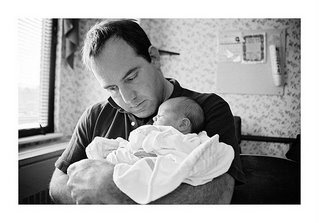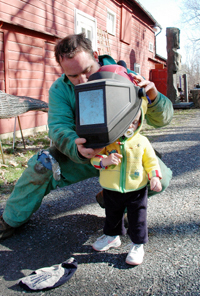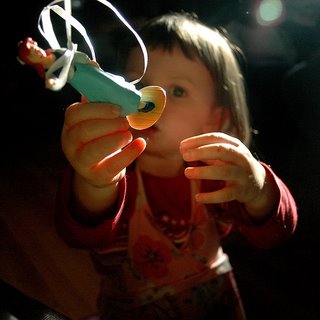 NOTE: What follows is the story of Annabel's birth. It's nearly three years old, but it was sought by The Mad Momma*******
NOTE: What follows is the story of Annabel's birth. It's nearly three years old, but it was sought by The Mad Momma*******I had an idea that things were not going well long before they went all wrong.
It was just a feeling. The same feeling that told me ultimately it would be alright.
As we sat in the marathon child-birthing class (neither of us had a consistent enough schedule to adhere to a once-every-Thursday-night thing) eyeing the others around the circle, wondering mostly who's gonna be first, I couldn't help but think this is all going to be wasted on me, I just knew it. I could feel it.
That Saturday in class we learned about the stages of labor. We learned about breathing; about the pain; the water breaking; the possibilities of not-so-pleasant occurrences, vomiting, diarrhea, hemorrhoids. We were told of technical things: Internal monitors, episiotomies, vacuum extractor. In the eight hours we were there we were led, step by step, through all the possibilities: Effacement, contractions, natural, induction, Pitocin, epidural. ... It wasn't until the very end -- 20 minutes before we were sent out into the world to stand and deliver -- the nurse showed a video about Cesarean Section.
Although I am a pessimist by nature, I had enough hope still clinging to me to reason they'd spent so little time on the possibility of abdominal surgery because if it came to that it was out of our hands anyway. That and I hoped having a c-section was a long shot.
Like many birth stories, Ittybit's is long and starts more than 24 hours before the hour and minute of her arrival was marked onto a piece of paper.
Doctors' office visit: ultrasound, biofeedback, hours in the waiting room to be examined, waiting another hour for a doctor who forgot me on the examining table, abraded membrane, contractions, more tests at a hospital (not the one where she was born), snow storm, contractions 5 minutes apart, dehydrated from no food and water and the all-day office visit. Home: food, pain, contractions five minutes apart. Hospital: drinking water, vomiting, more pain, contractions three minutes apart, dilation 2 cm. IV, blood work, pain. All. Night. Long. No sleep. 3 a.m. water breaks (or so I'm told. I can't tell). They have to take more blood since they fully expected to send me home in the morning and discarded the earlier samples.
The morning goes by with more of the same. Three cm dilated at most. Contractions seven minutes apart but they are doubled back-to-back when they come. The intern suggests an epidural with the Pitocin they plan to introduce at noon. I agree. The pain has been excruciating and it's now been 15 hours. They tell me the pain will subside 80 percent, but I don't feel any once the drugs take effect. I can see the contractions peak on the monitor but I can no longer feel them. They attach the bag of Pitocin to the saline drip. Immediately her heart rate plummets. Bells go off and the nurses all pile in. They don't believe the drugs have caused that reaction, it hasn't even had time to get into my bloodstream. The turn me onto one side and back again. We are alone again, watching the contractions, trying to rest.
It goes on like this for six more hours. Alarms each time the Pitocin is let loose in my blood stream. The bells ring as her heart rate drops when the contractions subside - baby in distress. After her day at the office my doctor comes in, reads my chart and tells me, calmly, it's time to get the baby out. C-Section.
A part of me is devastated and fearful. I've never had major surgery. Will I get an infection? Will I get to nurse her? Will I die on the table?
It seemed like an eternity passed between the time my doctor spoke those words and the time that they wheeled me into a chilly, sterile room where they would deliver our child.
They secured my arms, crucifixion-like to boards on either side of the table. They gave me an anti-nausea medication and tried to keep me calm. I wasn't although I pretended as best I could.
I wasn't prepared for how they pulled the baby free nor was I prepared for the talking: The annoying anesthesiologist who's job it was to distract me from the surgery and the discourse between the doctor and the students.
Let me tell you there are a few words patients never want to hear: "I've never seen anything like that in all my 25 years" is but eleven. My doctor had two words for me: "Teaching Hospital."
And thankfully, she spared four more: "you are perfectly fine."
I was bitter for a long time. I blamed that first doctor who left me all day, and who swept the membrane without so much as a word. I blamed myself; why could I not advocate for me?
But then I ultimately let it go, because I can not know. My doctor later told me it was unlikely I'd have ever been able to deliver her naturally. Something about the tilt of my pelvis and the size of her head.
I can't really complain, too much. I got her out of the deal. Yet, at the time, when they brought her close to my face before taking her away for what seemed an eternity, all I could do was chastize myself for not doing my eye strengthening exercises. ... She was so close I couldn't see her face clearly. ... Although it turned out all the fluid welling up in me from the IVs was the real culprit.
But I suppose what really sticks with me now, these few years later, is the fanaticism I hear surrounding c-sections and the people who ultimately have them:
We are told that C-sections have increased in the United States because of the advanced age of the mothers; because of liability and because some moms don't want to deal with the pain and effects of childbirth. Elective C-sections are considered ethical.
I think it's perfectly acceptable to debate the topic; to question the effectiveness and ethics of such issues as a public service, however, such debate often turns rancorous when it becomes personal. And guess who all eyes are upon then?
The woman with the scars.
I've heard women bash other women for their choices as well as the choices made for them: "Don't be a pussy, use your pussy" and the like. It's stunning, really, how interested we are in looking down our noses at others in order to lift ourselves up. I'm beginning to feel like a broken record when I say, for a multitude of topics, "Who am I to judge someone else? I don't know anything about them, and even when I think I might, chances are I'll be wrong."

 Since we were biting the bullet, we decided we might as well buy a bed frame to boot. You know finally get it off the floor (we're not in college anymore, right?) So we select some moderately priced sleigh bed to go with our extremely high priced, state-of-the-art back support mattresses (incidentally sold by sheep).
Since we were biting the bullet, we decided we might as well buy a bed frame to boot. You know finally get it off the floor (we're not in college anymore, right?) So we select some moderately priced sleigh bed to go with our extremely high priced, state-of-the-art back support mattresses (incidentally sold by sheep).














